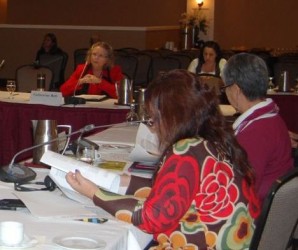Article Origin
Volume
Issue
Year
Senator Lillian Dyck said the Standing Senate Committee on Aboriginal Peoples is not thinking about doing away with the Powley definition of Métis, but is considering the need for “a notwithstanding clause.”
“It was quite clear to us that the regional, provincial organizations are all on board with what the national definition is and are working with that. But what we’re hearing is that individual Métis people sometimes do not fall completely within that definition, so people are suggesting to us that there may be clauses or whatever, sort of like a notwithstanding clause, that allows those people, who for some reason don’t quite fit, that if the community of people accepts them, that there may be an exception made,” Dyck said.
Dyck, who is deputy chair of the standing committe was in Edmonton as part of a two-week tour, which made stops in Manitoba, Saskatchewan, British Columbia and the Northwest Territories.
The definition adopted by the five provincial Métis government organizations, as well as the Métis National Council, is, “Métis means a person who self-identifies as Métis, is distinct from other Aboriginal peoples, is of historic Métis Nation ancestry, and is accepted by the Métis Nation.”
According to the federal government’s Aboriginal Affairs and Northern Development Web site, the Powley decision provides “guidance on who can claim Aboriginal rights under Section 35 of the Constitution and the term Métis refers to distinctive peoples of mixed ancestry who developed their own customs, practices, traditions and recognizable group identities separate from their Indian, Inuit and European ancestors. The term “Métis” does not refer to all individuals of mixed Aboriginal and European ancestry.”
Section 35 recognizes and affirms the existing Aboriginal and treaty rights of the Indian, Inuit and Métis peoples.
But any widely-accepted definition of Métis leaves out a whole group of people, University of Alberta law professor Catherine Bell told the Senate committee.
“There are Métis populations who for a very long period of time, even before the assertion of effective control, identified as Métis but won’t necessarily fit a definition that requires them to trace their ancestry to the Métis nation,” Bell said. She refers to this category as “contemporary self-identifying Métis groups.”
Dyck pointed to a woman in Saskatchewan the committee had heard from, whose family had lived in the Duck Lake area for 40 to 50 years, but who didn’t fit the Powley definition of Métis.
“So you’re saying that is the social-political definition (of Métis) versus the legal definition, which may cut her out, but the social-political definition allows her in?” Dyck asked.
Bell, however noted she wasn’t sure that the Powley definition required a connection to a Métis nation.
“Powley, I think, suggests as long as you can trace to a distinctive Métis community that will be sufficient. But the question is, who’s that community?” Bell asked.
She also pointed to the unique situation which exists in Alberta with Métis settlements. In a decision rendered by the Supreme Court of Canada in 2011 in Cunningham v. Alberta, the judge ruled that the Métis settlements could determine their own membership.
Bell said she wasn’t opposed to dual citizenship, which would allow someone to register as both Métis and First Nation, but they “should not be allowed to double-dip” and get benefits set out for both Métis and First Nation.
She said a “process-based solution” was required, but one that didn’t utilize the courts or depend on the government alone because the government has a vested interest as it provides funding.
Bell suggested instead that peers and people appointed by the parties involved sit in judgement.
It is this grey area that prompted the Senate committee to delve into the issue of defining who is a Métis, said Senator Gerry St. Germain, who chairs the committee. He noted that when funding was attached to Métis status, such as education scholarship dollars, a definition was a necessity.
“There still is a lot of controversy. (Powley) doesn’t really speak of homeland and other issues that relate to membership,” Germain said.
- 4512 views

